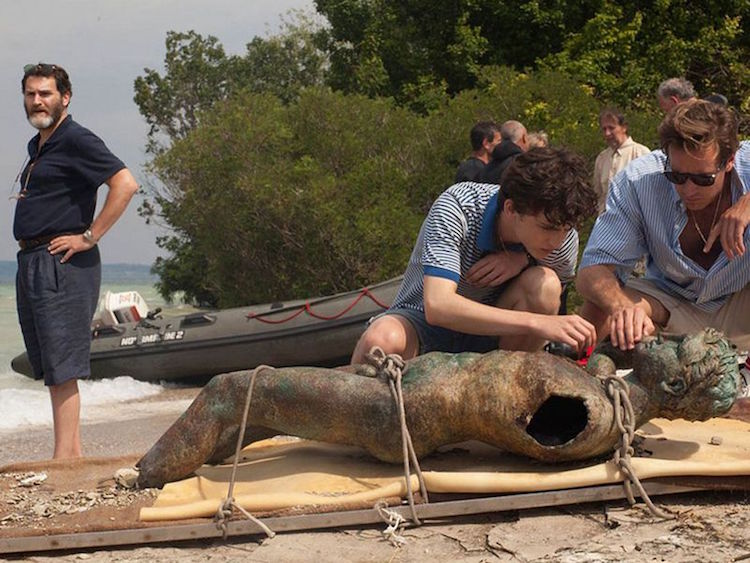You know when you see a movie and it just stays with you? You know, those rare films where you just can’t stop thinking about the storyline and the characters for days, and in my case with Call Me by Your Name, weeks afterwards?
While the Oscars predictably chose a big budget movie to win Best Picture this year in lieu of an artistic masterpiece; the clear winner should have been Call Me by Your Name. The film, directed by Luca Guadagnino and written by James Ivory (who deservedly took home the Oscar for Best Adapted Screenplay for the film), depicts a heart-wrenching story of equal parts love and torment. Unlike many other films in the coveted Best Picture category, Call Me By Your Name doesn’t rely on things like special effects, extravagant sets, or detailed costuming to carry its story. Instead, the film is carried by powerful and emotional performances by Best Actor nominee Timothée Chalamet, Armie Hammer, and the rest of the supporting cast.

Set in the summer of 1983, graduate student Oliver (played by Hammer), joins his archaeology professor, Mr. Perlman (played by Michael Stuhlbarg) and his family at their villa in the Italian countryside. Over the course of the summer, Mr. Perlman’s precocious seventeen-year-old son Elio (played by Chalamet), becomes infatuated with his father’s student.
Throughout the first half of the film, Oliver and Elio involve themselves in heterosexual relationships, as if trying to talk themselves out of what they really want. Elio yearns for Oliver, uncertain of whether or not his feelings are mutual. As the film progresses, the tension building between the pair becomes excruciating. In one scene, Elio lustfully watches Oliver dance with a girl at a bar. In another scene, he sneaks into Oliver’s bedroom to smell his undergarments. Elio desperately aches for him. After he subtly hints towards his feelings for Oliver, Oliver gets up the nerve to kiss him. By the time this much anticipated kiss happens, the audience has been practically yelling at the screen, JUST FUCKING KISS EACH OTHER ALREADY! The audience wants so badly for Elio’s feelings for Oliver to be reciprocated, and luckily for us, they are.
Eroticism is at the forefront of the entire film. The camera voyeuristically lingers upon Oliver’s masculine body, highlighting his toned legs beneath his short-shorts, and the gold Star of David nestled in his tufts of chest hair. One day, as Oliver and Mr. Perlman are cataloging Roman statues for their work, Mr. Perlman remarks, “There’s not a straight line in any of these statues; they’re all curved, as if daring you to desire them.” These rock hard statues, daring to be desired, are interspersed throughout the duration of the film. In a not so subtle display of eroticism, Elio pleasures himself with a peach. While this may sound outwardly perverse, the scene is presented delicately and is a raw demonstration of a young man giving in to his sexual desires. As a metaphor, the scene suggests that Elio is on the cusp of manhood, and is now ripe with sexuality.
 Soon after they share their first kiss, Elio sneaks into Oliver’s room and the pair make love for the first time. The chemistry between the pair sends chills down your spine. It’s the kind of chemistry that one hopes they can capture just a sliver of at least once in their lifetime. As the morning light washes over their faces, Oliver whispers to Elio gingerly, “Call me by your name, and I’ll call you by mine.” Throughout the rest of the film, Elio and Oliver playfully call each other by their own names. This gesture is intimate, and we can feel that Elio and Oliver are becoming a significant part of each other.
Soon after they share their first kiss, Elio sneaks into Oliver’s room and the pair make love for the first time. The chemistry between the pair sends chills down your spine. It’s the kind of chemistry that one hopes they can capture just a sliver of at least once in their lifetime. As the morning light washes over their faces, Oliver whispers to Elio gingerly, “Call me by your name, and I’ll call you by mine.” Throughout the rest of the film, Elio and Oliver playfully call each other by their own names. This gesture is intimate, and we can feel that Elio and Oliver are becoming a significant part of each other.
By the time Oliver and Elio finally consummate their relationship, we come to the heartbreaking realization that summer is almost over. Soon, Oliver will need to pack up and head home to New England. While it would be predictable to have a character in the film trying to drive the two apart; the only force working against the pair are the concepts of time and distance. These constraints resonate with viewers: How often has love slipped through your fingertips because you were at the right place at the wrong time? As a whole, the film is relatable because, at its essence, it is a story two people tormented by young love and its fleeting nature.

Timothée Chalamet’s performance is captivating the whole way through, but the most beautiful and raw part of his performance occurs in the very last scene of the film. Upon realizing that his relationship with Oliver is over for good, Elio stares into the fireplace. We bear witness to a several-minutes-long closeup of Elio quietly suffering through the pain of his broken heart. As his family busily prepares Hanukkah dinner behind him, we watch the sorrow wash over forlorn Elio’s face. “Visions of Gideon“ by Sufjan Stevens, is perfectly paired with the scene. The song softly plays in the background as the fire crackles. The pain of Elio’s heartbreak is poignant and deeply relatable.
Mr. Perlman puts it best earlier on in the film when he tells his son, “Nature has a cunning way of finding our weakest spot.” And doesn’t it ever? Cue the waterworks.
Check out “Call Me by Your Name” in theatres while you still can.















